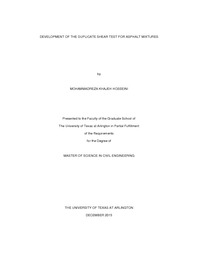| dc.contributor.author | Khajeh Hosseini, Mohammadreza | |
| dc.date.accessioned | 2016-02-24T20:24:05Z | |
| dc.date.available | 2016-02-24T20:24:05Z | |
| dc.date.issued | 2015 | |
| dc.date.submitted | January 2015 | |
| dc.identifier.other | DISS-13377 | |
| dc.identifier.uri | http://hdl.handle.net/10106/25602 | |
| dc.description.abstract | Permanent shear deformation is the main cause of rutting in asphalt concrete layers. Therefore, the determination of the shear properties of asphalt mixtures is helpful for predicting the rutting in asphalt pavement structures and for the identification of poor performing asphalt mixtures. The objective of this study was to develop a new test device to replicate similar loading conditions and constraints of the Superpave Shear Tester (SST). The new device, named the Double Shear Tester (DST), determines the mechanical average of the shear properties and responses of two specimens instead of that of a single specimen as in the SST tests. The DST device is simple and inexpensive and can be used with any universal testing machine that can provide repeated dynamic and static axial loads in a temperature-controlled environment. The two most used SST test procedures, the Frequency Sweep Test at Constant Height (FSCH) and the Repeated Shear Test at Constant Height (RSCH) were performed with the DST device mounted inside of an UTM-25 test system, which is a universal testing machine.To evaluate the effectiveness of the DST, four asphalt surface mixtures were subjected to FSCH and RSCH tests. For each mixture, three pairs of specimens were tested. The FSCH tests were performed at 30°C to measure the dynamic shear modulus and phase angle of the mixtures at ten loading frequencies between 0.01 to 10 Hz. As the FSCH is theoretically performed in the linear viscoelastic behavior domain, the FSCH test was performed twice on some sets of the specimens. The RSCH tests were performed at 50°C and the permanent shear deformation of the specimens were reported at 5,000 loading cycles.From the data analysis of the FSCH test results, it has been concluded that the DST test is highly repetitive and reliable in measuring the dynamic shear modulus and phase angle at high load frequencies between 0.5 Hz to 10 Hz, for which a variability of less than 10% was observed. A variability higher than 10 percent was recorded for the FSCH tests done at frequencies lower than 0.5 Hz. The RSCH test results demonstrated the capability of the Double Shear Tester in evaluating the permanent shear deformation of asphalt concrete mixtures. A variability slightly higher than 10 percent was observed for the shear permanent deformation of two of the asphalt mixtures. | |
| dc.description.sponsorship | Romanoschi, Stefan | |
| dc.language.iso | en | |
| dc.publisher | Civil & Environmental Engineering | |
| dc.title | Development Of The Duplicate Shear Test For Asphalt Mixtures | |
| dc.type | M.S. | |
| dc.contributor.committeeChair | Romanoschi, Stefan | |
| dc.degree.department | Civil & Environmental Engineering | |
| dc.degree.discipline | Civil & Environmental Engineering | |
| dc.degree.grantor | University of Texas at Arlington | |
| dc.degree.level | masters | |
| dc.degree.name | M.S. | |

